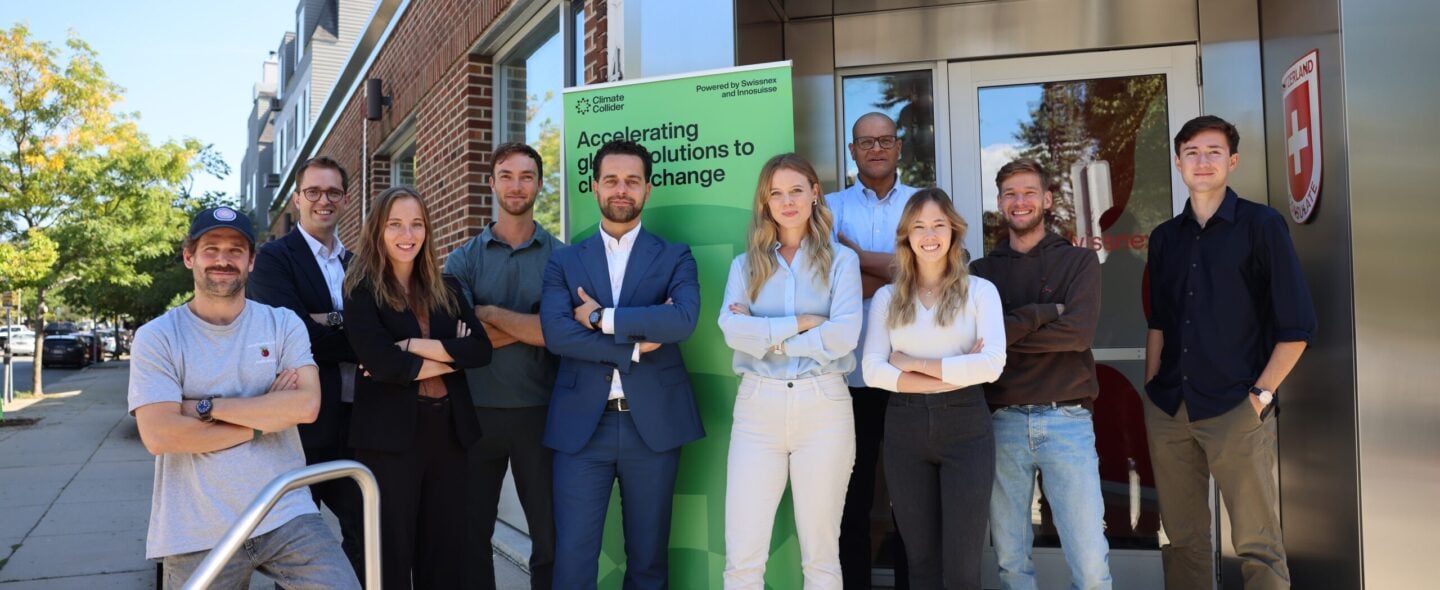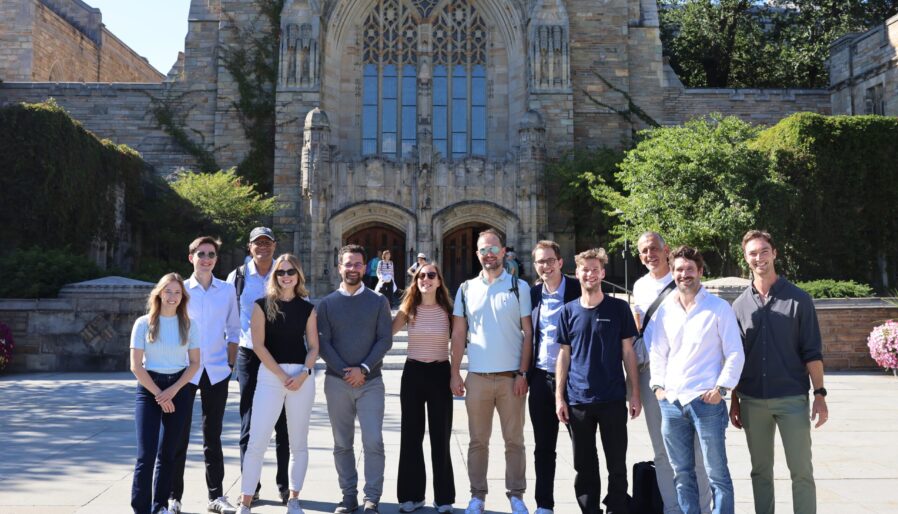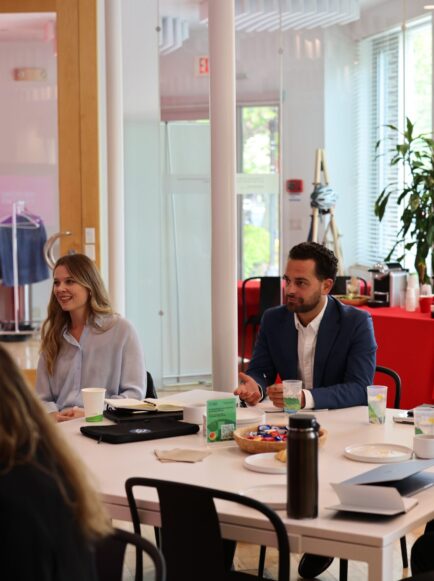
October 7, 2025 | Boston & New York
Climatetech is navigating a period of uncertainty, in the U.S. and globally. While climate regulations and public investment are facing rollbacks, renewable energy has already surpassed coal in its share of global electricity generation and looks poised for rapid growth in the coming years. Amid this shifting landscape, eight Swiss startups visited Boston and New York this September as part of Climate Collider, the startup exchange program powered by Innosuisse and managed by Swissnex. Over two weeks, they took the temperature of the American climatetech ecosystem—and were encouraged by what they discovered.
“We always hear the news about the current diplomatic and political situation in the U.S., but if you look just at the people who talked to us here in Boston, […it] was nice to see that the space is still alive and well,” said Gaudenz Halter, co-founder & CTO of Correntics, a company providing climate risk analysis for global supply chains. “The U.S. is a fantastic market, and has huge potential for climate tech startups, even if current times are a bit uncertain or turbulent,” echoed Correntics co-founder & CEO Michael Gloor.
The first week of the program kicked off in Boston, where the startups explored a thriving climatetech ecosystem driven by collaboration between research institutions, startups, investors, and public initiatives. In addition to taking part in a number of workshops on pitching, hiring, and product fit, the cohort got insights from Boston-based founders during peer-learning sessions and pitch feedback from experienced climatetech investors, including during the Climate Collider Garden Party at the Swiss residence in Lexington. Throughout the week, they also got to know key nonprofit and governmental ecosystem builders, including the Massachusetts Clean Energy Center (MassCEC), the Alliance for Climate Transition, and Greentown Labs, the world’s largest climate tech incubator. The week ended with a day trip to New Haven, Connecticut, where the startups visited ClimateHaven, toured the Yale campus, and held meetings with local investors focused on early-stage climatetech ventures.
Week two of the program brought the startups to New York to experience Climate Week NYC, the largest climate action festival of its kind, with over 1000 events across the city. The startups took advantage of the opportunity to connect with other founders, investors, and potential partners and customers. They were also able to participate in Swissnex’s Planetary Embassy at Climate Week NYC, with members of the cohort presenting at the Climatetech Investor Summit and Food Circularity in Action.
The peer-to-peer learning was equally as important as being introduced to VCs, learning how to pitch, and how to present ourselves.
During their stay, the startups experienced first-hand the differences of doing business in the U.S. “There is actually a significant difference in perception of how to build a company between Swiss founders and U.S.-based founders, and the pathways that the individual environment is offering are different,” said Danny Chatziprodromou, founder and CEO of REOR20, a startup using physics-based AI to analyze flood risk. “So the transition to the U.S. market as a Swiss company has some cultural obstacles that you have to overcome.” Workshops on pitching and in-depth feedback from experienced investors gave the startups the tools to better navigate these differences. “How do we approach this market from our European perspective, what are the cultural differences, and what are the things to do or not to do?,” said Estelle Clerc, CEO & co-founder, of CellX Biosolutions, using bacteria to break down persistent chemical pollutants. “I think this program really helped me to better understand what things to pay attention to, but also how to approach them.”
The opportunity to explore multiple ecosystems also gave the startups valuable perspective on the unique advantages of different regions—and the possibility of looking beyond Boston and New York. “The program helped us by giving us an understanding of how each city works, how they want to attract companies from abroad, and all the different benefits that you can have as a Swiss company moving to the U.S.,” said Jonathan Comotti, head of sales at KITRO, a startup using AI analysis to reduce waste in commercial kitchens. At the same time, the visit underscored the importance of choosing the right location for a U.S. subsidiary. “Boston is a really dynamic place, it’s a really nice place to be as a company, but it’s an expensive place. You have to have the need to be here – then it can actually be a really great place to be,” said Halter.
Above all, the participants valued the opportunity to learn from each other and the U.S.-based founders. “The peer-to-peer learning was equally as important as being introduced to VCs, learning how to pitch, and how to present ourselves,” said Marvin Campbell, CEO of Hertzfeld Bioenergie, a company providing circular solutions for biological, medical, and glass waste. “I’m going to keep a memory of very strong connections with the other founders, especially more advanced CEOs that have been in the game for longer than me. It has really helped me understand their strategy, not only […] in Europe, but also how they approach the U.S. market,” said Clerc.
By the end of the program, the startups had gained new perspectives, practical tools, and promising leads with customers and investors across the Northeast. Reflecting on his experience, Campbell had the following advice for prospective participants: “You won’t be held by the hand, but you’ll be guided in the right direction. You’ll meet partners that are imperative to look into certain areas, and you’ll get all the help that you need in regards to how, when, and if to approach them, and the Swissnex team is always there, right beside you.”
Climate Collider will continue in 2026. Subscribe to our newsletter to get the latest updates.

